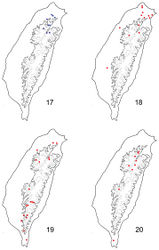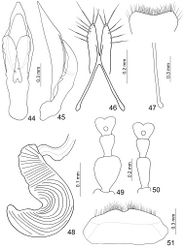Paridea costata
| Notice: | This page is derived from the original publication listed below, whose author(s) should always be credited. Further contributors may edit and improve the content of this page and, consequently, need to be credited as well (see page history). Any assessment of factual correctness requires a careful review of the original article as well as of subsequent contributions.
If you are uncertain whether your planned contribution is correct or not, we suggest that you use the associated discussion page instead of editing the page directly. This page should be cited as follows (rationale):
Citation formats to copy and paste
BibTeX: @article{Lee2014ZooKeys405, RIS/ Endnote: TY - JOUR Wikipedia/ Citizendium: <ref name="Lee2014ZooKeys405">{{Citation See also the citation download page at the journal. |
Genus: Paridea
Name
Paridea costata (Chûjô, 1935) – Wikispecies link – Pensoft Profile
- Paraulaca costata Chûjô, 1935: 164.
- Paraulaca (Carapaula) costata: Chûjô 1962[1]: 198 (redescription); Chûjô 1963[2]: 395.
- Paridea (Paridea) costata: Gressitt and Kimoto 1963: 512[3]; Kimoto 1966[4]: 29; Kimoto 1969[5]: 33; Kimoto 1989a[6]: 251; Kimoto 1991[7]: 11; Takizawa et al. 1995[8]: 12.
Type locality
Taiwan, Hualien.
Type material
Lectotype male (TARI), pinned, here designated to fix the concept of Paraulaca costata Chûjô and to ensure the universal and consistent interpretation of the same, labeled: “Formosa [p] / Karenko [= Hualien], -19 [p] / VII 20-VIII 4. T. Okuni, [p, w] / COTYPE [p, circle label with yellow letters] // Paraulaca [h] / costata [h] / Chûjô [h] / DET. M. CHUJO [p, g] // 1491 [p, w] // Lectotypus [p] / Paraulaca costata ♂ [p] / Chûjô, 1935 [p] / des. C.-F. Lee, 2014 [p, r]”. Paralectotypes: 1♂ (TARI): “Formosa [p] / Y. Miwa [p, w] // COTYPE [p, circle label with yellow letters] // Paraulaca [h] / costata [h] / Chûjô [h] / DET. M. CHUJO [p, g] // 2585 [p, w]”; 1♀ (TARI): “14/IV 1918 [h] / Bakuras [= Bakulasi, in Nantou] [h] / Col. I. Nitobe [p, w] // COTYPE [p, circle label with yellow letters] // Paraulaca [h] / costata [h] / Chûjô [h] / DET. M. CHUJO [p, g] // 1490 [p, w]”; 1♀ (TARI): “Horisha [= Puli, in Nantou] [h] / Apr 2. 1919 [h, w] // COTYPE [p, circle label with yellow letters] // Paraulaca [h] / costata [h] / Chûjô [h] / DET. M. CHUJO [p, g] // 2586 [p, w]”; 2♂♂ (SDEI): “Taihorin [= Talin, in Chiayi] [p] / Formosa [p] / H. Sauter, 1911 [p, w] // 7.VIII. or 7.VII. [p, w] // Syntypus [p, r] // Paraulaca [h] / costata [h] / Chûjô [h] / DET. M. CHUJO [p, g] // DEI Müncheberg [p] / Col – 04199 and 04200 [p, g]”. Each paralectotype has a type label: “Paralectotypus [p] / Paraulaca costata ♂ [or ♀] [p] / Chûjô, 1935 [p] / des. C.-F. Lee, 2014 [p, pink label]”
Additional material examined
(n = 29). TAIWAN: Hualien: 1♀, Taroko N. P., 3.vi.2008, F. & L. Kantner leg. (JBCB); Hsinchu: 1♀, Mamei, 4.V.2008, leg. S.-F. Yu (TARI); Ilan: 1♀, Suchi, 19.V.2010, leg. H.-J. Chen (TARI); Nantou: 3♂♂, 1♀, Sungkang, 2.VII.2008, leg. M.-H. Tsou (TARI); 2♂♂, 1♀, Tungpu, 28.IV.-2.V.1981, leg. T. Lin & C. J. Lee (TARI); 1♂, Wushe, 30.VIII–2.IX.1982, leg. L. Y. Chou & K. C. Chou (TARI); 1♂, same locality, 19–22.IV.1983, leg. K. C. Chou & S. P. Huang (TARI); Pingtung: 1♀, Suchunghsi, 8.V.2013, leg. Y.-T. Chung; Taichung: 2♂♂, 1♀, Kukuan, 16.VII.2007, leg. M.-H.Tsou (TARI); 1♀, Wuling, 30.VI.2008, leg. S.-F. Yu (TARI); Taoyuan: 1♀, Hsuanyuan, 16.III.2008, leg. S.-F. Yu (TARI); 6♂♂, 1♀, Tamanshan, 2.VIII.2008, leg. S.-F. Yu (TARI); 1♂, 5♀♀, same locality, 2.VIII.2008, leg. M.-H. Tsou (TARI).
Diagnosis
Paridea (Paridea) costata is recognized by the black vertex, presence of one black spot on the pronotum, the metallic blue elytra, and the swollen first tarsomeres of front and middle legs of males.
Males
Length 4.5–4.7 mm, width 2.2–2.4 mm. General color (Figs 34–36) yellowish brown; antenna blackish brown but three basal antennomeres paler; vertex with one big black spot; pronotum with a moderate black spot near center; scutellum and elytra bluish black; metathoracic ventrites black; tibia and tarsi dark brown; femora darkened except bases and apices. Elytra with one longitudinal costa arising from humerus, reduced in some individuals. Median lobe at fifth abdominal ventrite deeply depressed. Eighth abdominal tergite (Fig. 51) weakly sclerotized but apex well sclerotized, transverse and wide, apical margin emarginate at middle, with dense long setae along apical margin. First tarsomeres of pro- and mesotarsi swollen (Fig. 49). Penis (Figs 44–45) wide, apically tapering, apex truncate, slightly curved near based from lateral view; with one pair of elongate processes extending from near apex to middle, base curved upwards from lateral view; external process large and wide, lateral margin irregular from middle to apex, with a small process at middle of lateral margin; endophallus without visible sclerites.
Females
Length 4.7–4.9 mm, width 2.5 mm. Similar to male; apical margin of last abdominal ventrite smooth, not modified. Gonocoxae (Fig. 46) slender, apex of each gonocoxa with seven or eight setae from apical 1/7 to apex; connection of gonocoxae extremely slender, base slender. Sternite VIII (Fig. 47) weakly sclerotized; apex wide, apical margin emarginate at middle, surface with dense long setae on apical margin, spiculum short. Spermatheca (Fig. 48) strongly sclerotized, disk with dense transverse grooves; receptaculum narrower than pump; pump short and wide, strongly curved; spermathecal duct short, stout, shallowly projecting into receptaculum.
Distribution
China (Gansu, Jiangxi, Sichuan, Zhejiang), Taiwan. It is uncommon but widespread in Taiwan (Fig. 20).
Host plants
Cucurbitaceae: Thladiantha nudiflora Hemsl. ex Forbes & Hemsl.
Taxon Treatment
- Lee, C; Bezděk, J; 2014: Revision of the genus Paridea Baly, 1886 from Taiwan (Coleoptera, Chrysomelidae, Galerucinae) ZooKeys, 405: 83-125. doi
Other References
- ↑ Chûjô M (1962) A taxonomic study on the Chrysomelidae (Insecta: Coleoptera) from Formosa. Part IX. Subfamily Galerucinae. The Philippine Journal of Science 91: 1-239.
- ↑ Chûjô M (1963) Chrysomelid-beetles from Formosa, preserved in the Hungarian Natural History Museum, Budapest. Annales Historico-Naturales Musei Nationalis Hungarici 55: 379-402.
- ↑ Gressitt J, Kimoto S (1963) The Chrysomelidae (Coleopt.) of China and Korea, Part 2. Pacific Insects Monographs 1B: 301–1026.
- ↑ Kimoto S (1966) A list of the Chrysomelid specimens of Taiwan preserved in the Zoological Museum, Berlin. Esakia 5: 21-38.
- ↑ Kimoto S (1969) Notes on the Chrysomelidae from Taiwan II. Esakia 7: 1-68.
- ↑ Kimoto S (1989a) The Taiwanese Chrysomelidae (Insecta: Coleoptera) collected by Dr. Kintaro Baba, on the occasion of his entomological survey in 1983 and 1986. Kurume University Journal 38: 237-272.
- ↑ Kimoto S (1991) The Taiwanese Chrysomelidae (Insecta: Coleoptera) collected by Dr. Kintaro Baba, on the occasion of his entomological survey in 1987, 1988 and 1989. Kurume University Journal 40: 1-27.
- ↑ Takizawa H, Nakamura S, Kojima K (1995) The Taiwanese chrysomelid beetles preserved in Hiwa Museum for Natural History (Coleoptera: Coleoptera). Miscellaneous Reports of the Hiwa Museum for Natural History 33: 1-16. [in Japanese]
Images
|


